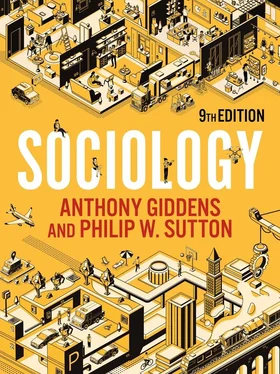As we will see throughout this chapter, the period sociologists call modernity brought large-scale societies into closer contact with each other in a variety of ways, from systematic trade and long-range economic exchange, international political agreements and global tourism to electronic communications and large-scale migration. In all these ways, people have become more interconnected, interdependent and geographically mobile than ever before (Sheller and Urry 2004; Urry 2007).

Migration and the research agenda on ‘mobilities’ in sociology is discussed in chapter 8, ‘Race, Ethnicity and Migration’.
The sheer pace of change in the modern era is evident in rates of human population growth. Livi Bacci (2012) studies the global population and its long-term growth. From an estimated 6 million people in 10,000 BCE, the global population rose to more than 6 billion by 2000 and reached 7.7 billion by 2019. However, the pace of population growth has been uneven, accelerating from around 1750, the start of the industrial period. The most striking demographic aspect here is the shrinking ‘doubling time’ of the global population. In 1750, it took 1,000 years for the population to double in size. By 1950 this was down to 118 years, and in 2000 it was a mere forty years. Livi Bacci (2017: 26) calculates that, at this rate, the world’s population will reach 11 billion by the end of the century, which, the UN (UN DESA 2019c: 5–6) estimates, may be the peak human population, as the pace of growth has begun to slow.
If 11 billion people seems unsustainable, remember that, in the nineteenth century, the idea that 7 billion people could survive on Earth was quite literally unthinkable, and yet it has already been reached and surpassed. Whether such unprecedented levels can be sustained depends not simply on the carrying capacity of the natural environment but also on economic and technological developments, social organization and political decisions.

Chapter 5, ‘The Environment’, looks more closely at the environmental impact of rapid human expansion.
In the rest of this chapter we look at the spread of key aspects of modernity before examining the various meanings attached to the concept of globalization. As a basic working definition, we can say that globalization is characterized both by a set of processes that bind the societies and people of the world into tighter interdependence and by a growing global consciousness that influences how people act. The speed at which the Covid-19 virus spread around the world in 2019–20 demonstrates the very high levels of geographical mobility of people and goods in our globalizing age. Many social scientists see the contemporary phase as the most significant development that will shape humanity’s future.

Chapter 6, ‘Global Inequality’, looks in more detail at some of the key evidence and theories from the discipline of demography.
Later in the chapter we will explore debates on whether globalization is highly significant or somewhat exaggerated and what its consequences might be. Before that we will set the current globalization debate into a much longer time frame, and there follows a sketch of human development over the very long term. This is necessary in order to understand better how the development of modern industrial-capitalist societies set the human world on its present global trajectory.

Globalization is one of our four central themes. A guide listing where to find the main sections and discussions can be found in the book’s Introduction.
Early societies and civilizations
Today we are accustomed to societies of tens of millions of people living in densely populated cities and urban areas. But this is historically unusual. For most of human history, the populations were smaller and less dense, and it is only quite recently that societies have existed in which the majority of the population consists of urban dwellers. To understand the forms of society that existed before modern industrialism, we have to draw on the historical dimension of our sociological imagination.
Human origins and migration
Currently, the evidence from ancient tools, fossils and molecular genetics suggests that Homo sapiens originated in Africa between 200,000 and 300,000 years ago. Cowen (2001: 20–4) argues that, around 100,000 years ago, small forager groups began to move in search of subsistence, first migrating across Africa before spreading to the Middle East and India and, later, to New Guinea, Australia, America and into Europe. Around 10,000 years ago, hunting was still dominant on all continents despite some settled communities; however, by 5,000 years ago, many more human groups were growing crops and forming settled societies and the first city societies had been established.
Global society 4.1 Humans and the domestication of fire
Over the course of human history, human beings gradually learned how to exert more control over the natural environment and were able to pass on this useful knowledge to geographically distant groups and to their own younger generations. In Fire and Civilization (1992), the Dutch sociologist Johan Goudsblom (1932–2020) argues that an especially significant development was the discovery of fire and the invention of techniques for making, managing and keeping it under control.
Human groups that learned how to make and use fire gained dominance over those that did not. Eventually all human societies were able to make and use fire, which enabled them to dominate other animal species. Goudsblom’s developmental history of fire shows something of the way that societies try to manipulate and manage the natural environment to their own advantage. In the process, though, there is also pressure on societies to change their own social organization.
From small domestic fires used for keeping warm and cooking food, all the way to modern central heating systems and large power plants, the gradual expansion of fire-making has necessitated more complex forms of social organization. When early humans learned how to make and manage small fires, they had to organize themselves to keep fires going, to monitor them and, at the same time, to stay safe. Much later, with the introduction of domesticated fires into private homes, societies needed specialists in fire control – fire brigades and fire-prevention advisers. With the advent of large power-generating stations, it has become important to protect these, militarily if necessary, from potential attack. Today, more people are more dependent on the easy availability and control of fire than ever before.
Goudsblom notes one further consequence of the domestication of fire: the changing psychology of individuals. To be able to use fire, people had to overcome their previous fear of it, perhaps born of seeing naturally occurring bush fires, lightning strikes or volcanoes. This was not an easy task. It meant controlling their fears and emotions long enough to be able to take advantage of the possible benefits of fire use. Such emotional control slowly came to be experienced as ‘natural’, so that people today hardly think about how long it has taken for humans to arrive at such high levels of control over their emotions.
Читать дальше













